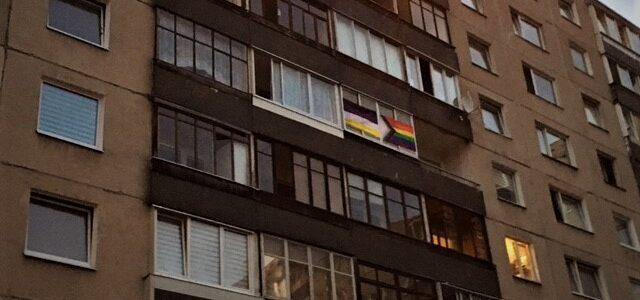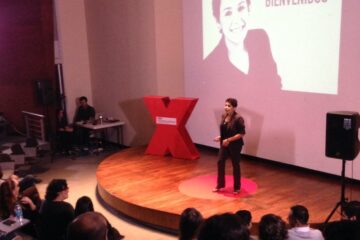Summers in the Baltic Sea region of Europe are over before you know it. After a long and dark winter that seems to last forever, come a few months of actual warmth. In the outskirts of Vilnius, not far from where HBO’s Chernobyl was filmed, the sun is shining again and life seems to be getting back to “normal”. As much as it can, considering the circumstances. The only difference is that before the pandemic, surgical masks have never been an element of the typical summer attire.
Other than that, it’s business as usual. People go about their lives among the brutalist plattenbau buildings, often dubbed Khrushchyovkas after the Soviet leader whose period in power made them particularly popular. Young people, deprived of social interactions during the long months of quarantine, gather near park benches to enjoy a cheap store-bought lager. On the other side of the street, babushkas on monobloc chairs sell net curtains made in China, strawberries from Greece, and locally picked chanterelles.
Somewhere in the middle of all that, there is me, trying to catch a few rays of sun on an enclosed balcony. It still has not entirely recovered from when the previous tenant neglected it so much that a pigeon built its nest in a corner and had two squabs hatch there… I am in the company of Szlomo, my 5-years-old black European shorthair. I am trying to read a book while anxiously conducting an experiment on how the locals will react to two pride flags hanging from my balcony windows.

If anything, they add a nice splash of color to the grayness of the surrounding residential blocks. But the locals, especially the elderly, or members of national minorities*, are not exactly eager to learn about (let alone accept) anything they do not understand. Overcoming the political and socio-economic transformation following the collapse of the USSR is still in progress, so talking about LGBTQ+ rights and gender equality seems like too much “Western propaganda” to many. Especially when their main news source is Russia Today.
All that considered, Vilnius feels much more comfortable and safe than my actual birthplace — Poland. After all, not too long ago my visit to Kraków to see friends and family was accompanied by vociferous demonstrations of so-called “patriots” waving white-and-red flags and holding up banners rejecting anything that even remotely deviates from their uniform, nationalistic view of what a “normal Pole” should be. Conservative, Catholic, heterosexual, cis-gender, xenophobic, sexist, you name it.
Among the slogans shouted by my countrymen during my last visit were “This is Poland, not Polin**,” “Death to the traitors of the nation”, and “Away with the Jews!” [sic] As a side note, I have only recently learned of my paternal family’s Ashkenazi roots after my grandmother took one of those modern-day DNA tests, so it has not yet fully established itself as part of my identity. Nevertheless, it was enough to make me feel unwelcome, threatened even, in the place I am supposed to call “home.”
Polish nationalists know neither logic nor irony. Not an ounce of self-reflection passes through anyone’s mind as they chanted hateful slogans, less than 3 kilometers from Schindler’s factory. THE factory from Spielberg’s Schindler’s List. And about 60 kilometers from the Auschwitz concentration camp — a major site of the Nazis’ so-called final solution to the Jewish question. Meanwhile, in 2021, police officers surround the city center to protect bystanders from the wrath of people who passionately claim to “love” their country. What a weird, twisted, toxic form of affection it is.
It seems only fitting to quote Albert Einstein, who said:
Nationalism is an infantile disease. It is the measles of mankind.
When left untreated, it leads to serious complications. It goes hand in hand with a variety of other forms of prejudice and will attach to virtually anything that may be seen as a threat to the idea of a “traditional”, sovereign, one-nation state, no matter how obsolete.
Walking through Kraków’s Old Town, I noticed that one of the police cars was parked right in front of the U.S. Consulate. All June, employees of the American diplomatic mission had been standing up against homophobic and transphobic comments online. In one of their windows hangs a six-color flag. To a Polish nationalist, a rainbow piece of cloth is what a red banner held by a torero is to a bull. He will attack it in a second in an attempt to destroy all it represents. Love and equality are acutely not among his values.
A few blocks from Kraków’s main touristic artery, local religious zealots joined forces with anyone who believes that “Thou shalt love thy neighbor as thyself” should be selectively applied only to those who support their own ideological agenda. While claiming to act in protection of their children, they scoured the crowd, collecting signatures under a petition entitled #StopLGBT. Conveniently ignoring that in Poland, the most homophobic of all EU Member States, nearly 70% of queer youth experience suicidal thoughts.
As a result, I would spend the next several nights infuriated, eyes wide open, having imaginary disputes in my head with “patriots” that would like to erase a hefty part of their homeland’s population. Arguments I could have probably had in real life, had I been less terrified of a confrontation. Eventually, what helps me sleep at night is that when I get up, I get to work with people who—as simple as it may sound—are not like that. I get to interact with a network of social change leaders who do not try to pigeonhole me, or anyone else, for that matter. A team of people who effortlessly accept me for who I am. Even though we are over 7,000 kilometers apart and have never actually met in person.
And this is pretty much what I’ve been getting at with this blog post, in case you’ve been wondering. I could list all the numerous benefits of doing a fellowship overseas, even if it’s just remotely, that can help you with your professional advancement, skill acquisition, and leadership development. But up until now, one of the things I came to value the most is the opportunity to work every day in an inclusive and diverse environment. Where I can be who I am. Where what I bring to the table defines my identity and not an entry in my passport or ID card.
In a way it may all sound rather obvious, because that’s just how things should be, shouldn’t they? Yet it is really not that common, at least not where I come from. Just about a year ago, I was abruptly fired from a Vilnius-based Polish radio simply for my support to a trans-activist during a local protest, which gathered fewer than two dozen people. At least that’s what I assumed the reason was, since I had never received proper notice. What I do know is that when I asked for an explanation, I was labelled a “persistent vermin” [sic] by the very man running the place. A signatory to the Independence Act of Lithuania, no less.
My Fellowship in Atlas Corps is obviously not my first job. Nor is it my first international gig. But it is the first time in quite a while that I have worked in a place actively committed to diversity and inclusion on a daily basis. Where not only is my hard work recognized, but where I also get to be whoever I am. Even when it’s just typing away from the worn-out couch in my Karoliniškės flat, connecting with the team in Washington, DC over Slack. I am yet to experience all that in person due to the prolonged travel ban on the Schengen Zone countries, but for all my experience thus far, I am forever grateful.
* According to the 2011 census, 15.8% of Lithuania’s inhabitants belong to ethnic or national minorities. Poles constitute nearly 7% and Russians almost 6% of the Lithuanian population.
** Polin is the Hebrew name for Poland, which can also be translated as “here you will dwell.”
Support LGBTQ+ Activists in Poland:
- Kampania Przeciw Homofobii (Campaign Against Homophobia) → donate here
- Grupa Stonewall (Stonewall Group) → donate here (bottom of the page)
- Lambda Warszawa (Lambda Warsaw) → donate here
Support LGBTQ+ Youth in the United States:
- The Trevor Project → donate here
Title photo by Karl Bewick on Unsplash.



